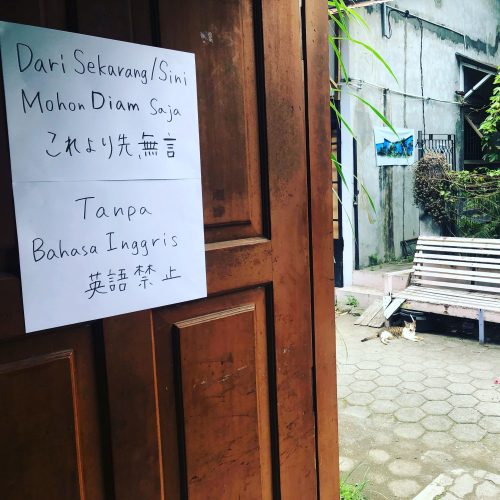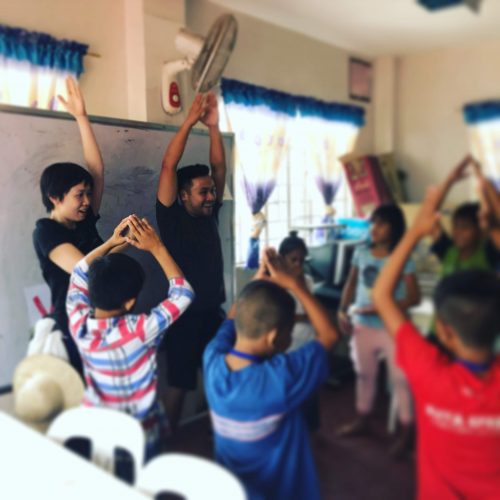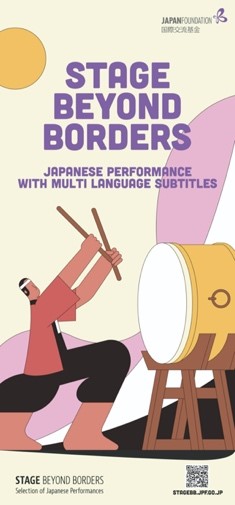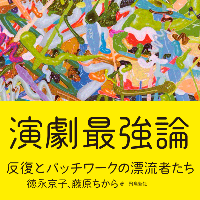【連載】これから演劇を始める人のための演劇入門 ENTRANCE=EXIT, FOR STARTING THEATER―第4場 アジアの共通言語はどのようにして構築可能か?<後編> How can we create a common language in Asia?<Part 2>
これから演劇
2019.06.13
【後編】
前編からの続きです。
今のところ英語は、「グローバル・エリートの言語」として定着しているかのように見えます。この強い言語は世界においてヘゲモニーを握り、英語が苦手な人々の劣等感/憧れ/競争心を巧みに利用しながら、グローバル化する資本主義経済の中で、その特権的な地位をより強固なものにしてきました。
しかしそれはあくまでも、現在の状況です。英語は長い苦難の歴史を持っています。言い換えれば、この言語は歴史的な産物であり、変わりうるものだということです。例えば9世紀頃にアングロ・サクソンの用いていた古英語は、ヴァイキングの言葉と融合して形を変えていったと言われています。11世紀にフランス系の王朝によってイングランドが支配された結果、長らく下位に置かれることになった英語は、もしかしたら絶滅してしまう危険性もあったかもしれません。しかし英語はフランス語系の語彙を取り入れてたくましく生き延び、やがて復権すると、シェイクスピアなどの作家を生み出す一方、船に乗ってヨーロッパを飛び出ていきます。そして英語は植民地支配の血塗られた歴史と共に拡散し、アメリカ合衆国やオーストラリアでは独特のアクセントへと変容し、シンガポールやフィリピンでは現地の言葉と結びついてピジン言語やクレオール言語を生み出しました。これからも英語は、それが生き残るかぎりにおいて、各地の状況と結びついて変容を遂げていくでしょう。
もしもあなたが、現在のこのグローバルな資本主義の競争のゲームボードに乗って「勝ち組」を目指すのであれば、単に、より流暢な英語を喋れる状態を目指せばいいのでしょう。そしてその流暢さに至らない人々を能力の不足した「負け組」として扱い、一部のエリート同士で議論を続けていけばいい。しかしわたしには、この道はすでに古い道に見えます。
もしもあなたが、アジアの、そして世界の様々なバックグラウンドへと目を向け、そこに生きる人々との共働を試みるのであれば、そんな「無意味な勝者」を目指すのではなく、他者の声に耳を傾け、新しい共通言語を探っていかざるをえないでしょう。いったいそれはどんな言語になるのでしょうか? 少なくとも、それは流暢な英語ではないはずです。
「そのような言語の壁は、優れた翻訳者や通訳がいれば越えられる」と考える人もいるかもしれません。しかし批評家レベルの議論についていくためには、彼/彼女は演劇やダンスのみならず、アジア各地で新たに生まれつつある未知の舞台芸術についての高度な理解力が必要とされます。そんな能力のある人がいったいこの世界にどれだけいるでしょうか? 仮に運良く適切な翻訳者/通訳を見つけたとしても、彼/彼女のスケジュールを押さえて充分な謝礼を払えるとはかぎりません。となると、翻訳者/通訳がついてくれるのは限られた状況だけと考えざるをえません。
そのため、わたしはこの連載のように、シンプルな英語と自動翻訳アプリでどこまでコミュニケーションを図れるか、という道を模索しています。これはリスキーな選択です。母語である日本語から疎遠になる危険もありますから。わたしは時々、捨て去ってしまった文学的なレトリックや饒舌さを懐かしむことがあります。しかしそれよりも重要なものが今はあると考えて、この実験的な執筆スタイルを採用しているのです。ただしこれはあくまでも暫定的な実験であって、翻訳者や通訳が不要という意味ではありません。実際わたしはこれまでたくさんの翻訳者や通訳と共働してきました。英語も大事ですが、とりわけ韓国語、マンダリン、広東語、タイ語、ミャンマー語、インドネシア語、各種フィリピン語、ドイツ語、各種手話……といった現地語への翻訳者/通訳はとても重要であり、彼らはわたしにとって必要不可欠なコラボレーターとなってきました。翻訳者/通訳は今後、舞台芸術において、ますますその「越境するコラボレーター」としてのプレゼンスを高めていくことになると思います。そうした認識の上でなお、この記事で強調しておきたいのは、仮に翻訳者/通訳がいれば事態は解決するとしても、そうした人材や予算を確保するのは簡単ではないということです。
さしあたって、わたしに提案があります。アジアにおけるアートの国際的なミーティングや創作現場においては、「英語は完璧な言語ではない」という認識を最低限の条件として共有するようにしてはいかがでしょうか?
その共通認識があるだけでも、「英語が流暢な人だけが喋り続ける」という無意味な状況が崩れ、その会話に参入できる人の母数は飛躍的に増えるはずです。その時、ブロークン英語は「暫定的な共通言語」となります。たとえすべての人々を包摂することはできないとしても……。通訳はこの不完全な会話をサポートするものとして機能するでしょう。そのような「完璧ではない」形でコミュニケーションを図ることによって、異なる言語環境に生きる人々が互いを理解し、それぞれのバックグラウンドとのあいだに橋を架けていく。今はそんな「土木工事」が必要な時期ではないでしょうか。
「土木工事」は一歩一歩進めていくしかありません。今は美しい幻想の橋よりも、でこぼこした現実の橋のほうが必要なのです。シンガポールのAAMR(Asian Arts Media Roundtable)については、その主催者であるArtsEquatorのキャシー・ローランド氏にすでに英語について同様の提案をしました。彼女は真摯に耳を傾けてくれました。こうした言語についての考え方は、東南アジア独自の言論環境をつくろうとしているArtsEquatorの設立趣旨とも共鳴するところがあるはずです。またわたし自身は、秋にジョグジャカルタと東京で開催するAPAF Lab.2019でキャプテンを務めますが、そこでの言語環境についてもこのような方針を採用するつもりです(このラボのオープンコールの締切は6月24日です。我こそはと思う方はぜひご応募ください!)。ただ、これは当面の処方箋でしかありません。将来的にはもっといろんな可能性が見えてくるでしょうし、いろんな人の意見や実践例を知りたいところです。
さて、最後にクエスチョンです。よかったらハッシュタグ #korekara_Q を付けてSNSで答えてみてくださいね。
Q1)ある朝、目が覚めたら、今まで理解できなかった言語が(ひとつだけ)ペラペラになっていました。それは何語ですか?
Q2)その言語を獲得した今、あなたは何をしますか?

ジョグジャカルタでの住吉山実里『筆談会』。英語圏以外での開催では、あえて英語を禁じ手にしてローカル言語での対話を試みている。スムーズな会話ができないことによって、引き出される何かがある。
Minori Sumiyoshiyama “Hitsudankai” in Yogyakarta. In non-English-speaking regions, she is trying to make dialogues in the local language, forbidding English. By the inability to have a smooth conversation, something will be pulled out.
【Part 2】
This is a continuation from Part 1.
So far, English seems to be established as the “Global Elite Language”. This strong language holds the hegemony in the world, and overuses the sense of inferiority / aspiration / competition of people who are not good at English. In the globalizing capitalist economy, it has strengthened its privileged position.
But that is just a current situation. English has a long history of hardships. In other words, this language is a historical product and something which can change. For example, in the 9th century, the old English used by Anglo-Saxon seems to have changed the form by merging with the language of Vikings. As a result of England being ruled by the French dynasty in the 11th century, English was placed at a lower layer. There could have been a danger of extinction. However, English survives vigorously with incorporating French-language vocabulary, and eventually regains its position. Then it produced writers such as Shakespeare, on the other hand, it went out of Europe on ships. And English spreads with the bloody history of colonial rule, turned into unique accent in US or Australia, and created pidgin languages and creole languages by combined with local languages in Singapore or the Philippines. From now on, as long as it survives, English will be transformed in connection with situations of various places.
If you want to get on the “game board” of the current global capitalist competition and become the “winner”, you just have to aim for more fluent English. Then you should treat people who don’t reach the fluency as the “loser” with a lack of ability, and continue discussions among only some elite. But for me, this way already looks like an old way.
If you focus on various backgrounds in Asia, and in the world, and try to work with people living in Asia, instead of aiming for such a “meaningless winner”, you will listen to others’ voices and explore new common languages. What language is it? At least, I think that is not fluent English.
Some people may think that “such a language barrier can be overcome with a good translator or interpreter”. However, in order to keep up with critics-level discussions, he / she needs a high level of understanding not only in theater and dance but also in emerging unknown performing arts across Asia. How many people in the world have such ability? Even if you find a suitable translator / interpreter, you may not be able to hold his / her schedule and pay enough rewards for him / her. So you can work with translators / interpreters in only limited situations.
Therefore, I’m usually looking for ways to communicate by simple English and automatic translation apps like this article series. This is also a risky choice for me. Because there is a danger of becoming alienated from Japanese, my native language. Sometimes I miss the literary rhetoric and verbosity which I have abandoned. But now I have something more important than them, and adopt this experimental writing style. This is only a tentative experiment, and it does not mean that translators and interpreters are unnecessary. In fact, I’ve worked with many translators and interpreters. English was also important, but translators / interpreters to local languages such as Korean, Mandarin, Cantonese, Thai, Myanmar, Indonesian, various Filipino, German, various sign languages… were especially important, and they were the necessary collaborators for me. Translators / interpreters will further increase their presence as “cross-border collaborators” in performing arts. Nevertheless, I would like to emphasize in this article: Even if translators / interpreters solves the situation, acquiring such human resources and budget is not easy.
For now, I have a proposal. In international art meetings and creations in Asia, how about putting the proposition “English is not a perfect language” as the minimum common recognition?
If there is the common recognition, the meaningless situation that “only those who are fluent in English can speak” will collapse, and the number of people who can enter the conversation will dramatically increase. At that time, broken English will be the “temporary common language”, even if it can not include all people of course… Interpreters will support this incomplete conversation. By communicating in this “not perfect” way, people living in different language environments can understand each others, and bridge between their backgrounds. I feel that now is a time for “construction works”.
“Construction works” can only be advanced step by step. Now we need a bumpy real bridge than a beautiful illusion bridge. As for AAMR (Asian Arts Media Roundtable) in Singapore, I’ve already told a similar proposal about English to Kathy Roland of Arts Equator who is the organizer of AAMR. She listened it sincerely. The way of thinking about such a language should resonates with the founding purpose of ArtsEquator, who is trying to create an unique discourse environment in Southeast Asia. Also, I myself will be the captain of APAF Lab.2019, which will be held in Yogyakarta and Tokyo in this autumn. I would like to adopt such a policy for the language environment. (This Lab’s open call deadline is June 24.) However, this proposal is only a temporary prescription. In the future, you will see more possibilities, and I would like to know the opinions and practices of various people.
At the end, there are questions. Please answer on your social media with a hashtag #korekara_Q
Q1) One morning, when you wake up, you can speak a language fluently (only one language) which you couldn’t understand until now. Which language is it?
Q2) Now you got the language. Then, what will you do?

フィリピン・マニラ郊外の町パヤタスは、「スモーキー・マウンテン」として知られ、2年前までゴミの山でスカベンジャーとして働く人たちがいた。様々な理由によって学校教育からドロップアウトした子供たちのため、現地のNGOソルト・パヤタスが開催した識字教育プログラムで、アルファベットを教える演出家のJKアニコチェ。フィリピンの子供たちにただ英語だけを教えてもそれは感情や身体を結びつかない、という信念のもと、授業はタガログ語と英語を交えながら行われた。
Payatas, a town outside Manila, Philippines, is known as “Smoky Mountain” and has people who work as scavengers on trash mountains until 2 years ago. This is a literacy education program organized by the NGO Salt Payatas for children dropped out of school for various reasons. JK Anicoche, an artist and a theater director, teaches alphabet. This program was conducted in English with Tagalog, based on the conviction that “teaching only English to Filipino children can not connect with their emotions and bodies”.



